Filament Dryer - Sunlu S4 review.

Living in a high-humidity region of the UK, I’ve battled brittle, popping, and tangled filament for years. Enter the Sunlu S4 filament dryer—a Kickstarter-backed gadget that promises to dry up to four 1kg spools at once (or 3 kg with a 3D-printed adapter). Does it actually rescue damp filament? Here's how it performed in real-world use.
What’s in the Box
- Sunlu S4 filament dryer unit
- Power cord and control panel
- Space for four 1 kg spools, plus optional adapter for larger spools (useful for filament rolls up to 3 kg)
- Quiet heating system that claims to reduce humidity below 25% in hours
Real-Life Drying Tests
1. Reviving a Year-Old Red Filament
This filament had been on the spool for over a year - virtually guaranteed to trap moisture. After a 4-hour drying cycle (aiming for 25% humidity), I loaded it into my updated hot end (Phaetus). The result? Smooth, squeak- and crack-free prints - no popping at all.
2. Breathing Life into a Gray Filament
Stored in a dry box, this spool fared better - but still held its breath when taken fresh from storage. After drying in the S4, it performed flawlessly on both my CR-10 Max and for my first Benchy test print.
Handy for Multi-Printer Setups
With two printers in my setup, the S4’s four-roll capacity was a game-changer. It fed both machines simultaneously, while letting me pre-load up to two more rolls for the next print batch. If you have an AMS system, this is also great for that as well.
What Could Be Improved?
As a Home Assistant user, I'd love to see Wi-Fi or MQTT-support baked in - for remote monitoring, managing dry cycles, or automating control. For now, I use a smart plug to control power, but a built-in automation interface would be next-level. In addition, the smart plug can't actually start the dryer on a cycle.
Final Verdict
The Sunlu S4 excels at its core function - drying filament reliably and quietly. It’s especially handy for multi-printer users or those with hobby automation setups. While automation features are absent, this unit is otherwise well-designed, functional, and worthy of a spot in your maker toolkit.
Recommended Gear
Here are some related items that pair well with the S4 - and yes, these are affiliate links to support the blog (at no extra cost to you):
- Sunlu S4 Filament Dryer – Insulate your spool from moisture for clean prints
- 3D-Printable Adapter – Supports larger 3 kg spools with ease
- Smart Plug – Schedule drying cycles via Home Assistant
About the author
Tim Wilkes is a UK-based security architect with over 15 years of experience in electronics, Linux, and Unix systems administration. Since 2021, he's been designing secure systems for a telecom company while indulging his passions for programming, automation, and 3D printing. Tim shares his projects, tinkering adventures, and tech insights here - partly as a personal log, and partly in the hopes that others will find them useful.
Want to connect or follow along?
LinkedIn: [phpsytems]
Twitter / X: [@timmehwimmy]
Mastodon: [@timmehwimmy@infosec.exchange]
If you've found a post helpful, consider supporting the blog - it's a part-time passion that your support helps keep alive.
⚠️ Disclaimer
This post may contain affiliate links. If you choose to purchase through them, I may earn a small commission at no extra cost to you. I only recommend items and services I’ve personally read or used and found valuable.
As an Amazon Associate I earn from qualifying purchases.